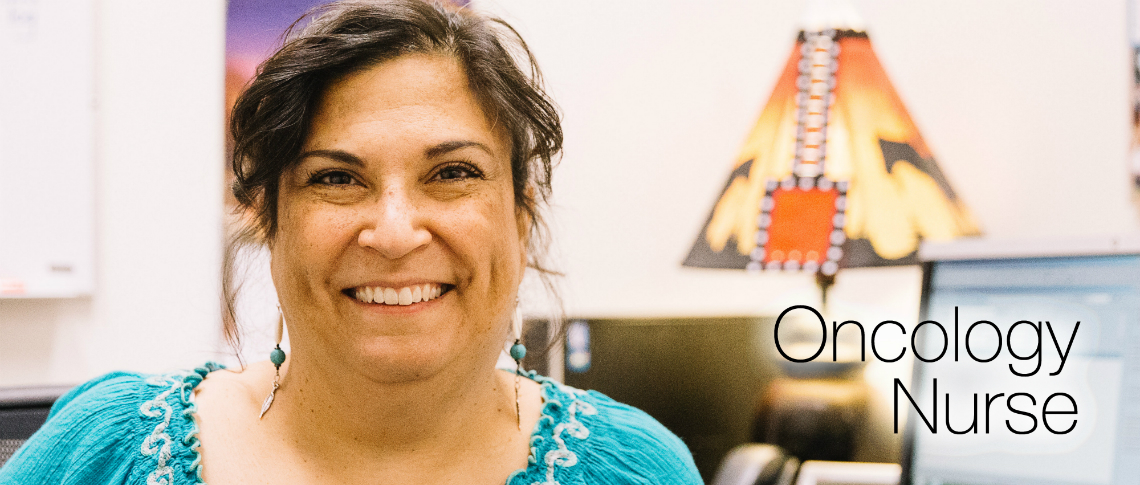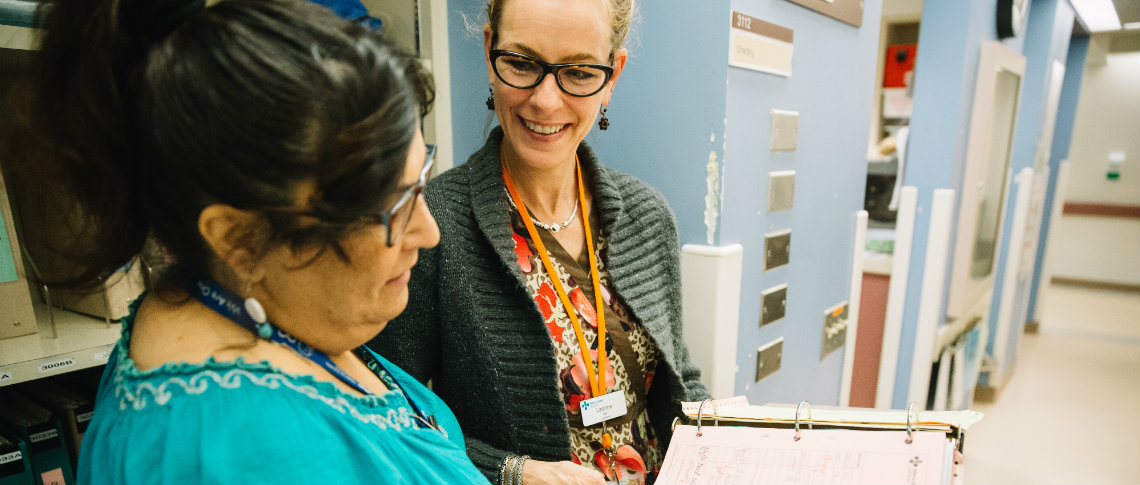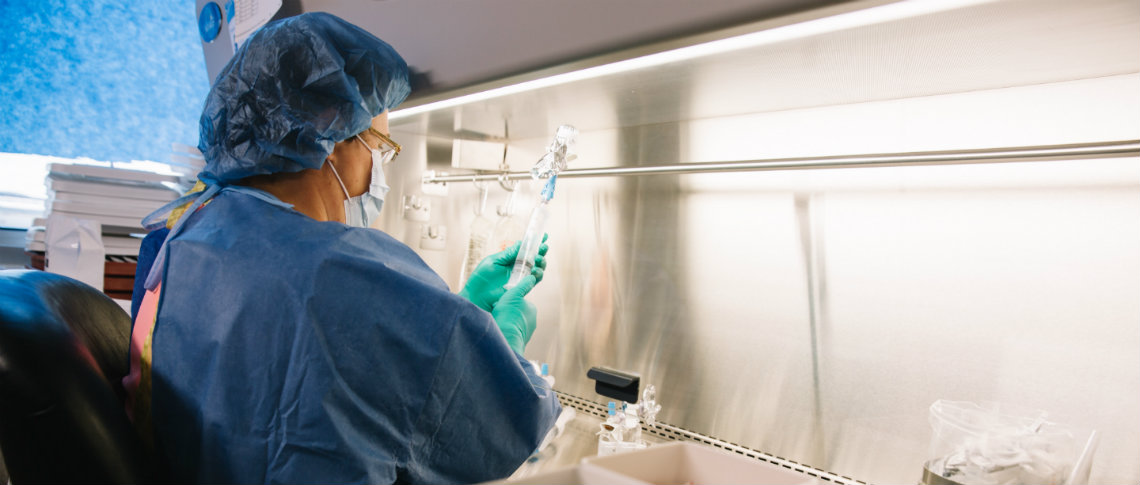

Why did you want to work in healthcare?
It’s funny – never in a million years did I think I’d be a Registered Nurse (RN). I had limited exposure to healthcare, and had always leaned toward positions along the lines of social work, counseling, or teaching.
My first real connection to healthcare was through my mother-in-law who was a nurse, and in the future would became my first role model. Still, I had a preconceived notion in my head that doctors delegated tasks, always telling the nurses what to do. However, I quickly learned that’s not the case at all.
When I had my first baby, I saw for myself what nurses can do and how independently they work. I was unaware of the scope of responsibility that nurses have, or all the different types of nursing that exist. This new knowledge prompted me to call my mother-in-law and say, “You know what? I owe you an apology!”
When I decided to go back to school, I looked into registered nursing and found that it incorporates aspects of social work, counseling, and humanities that I’d previously been interested in. Adding in the healthcare component meant that I would be able to help others in another very practical way. I thought, “I could do that!”
How did you get into oncology nursing?
I went into nursing a little bit later in life. When I started, I thought I’d go into labour and delivery, because I had kids and that was my personal healthcare experience.
During my final rotation, I had the opportunity to work at the Cross Cancer Institute. While it’s not what I initially thought I’d like, palliative and oncology care became something that appealed to me the more I learned about it. When it came time to choose my placement, oncology was my first choice.
I love it here! The team is really easy to work with, helpful, and nurturing, which is how I think nurses should be. Nurses should encourage and help each other grow professionally and personally.
Are there any misconceptions about oncology nursing?
I typically get asked what type of nurse I am, and where I work. Answering that question with “I am an oncology nurse at the Cross Cancer Institute” often leads to comments from people along the lines of ‘Oh my gosh, I could never do that, that’s so depressing!’ Everyone has a cancer connection, whether it’s knowing someone that has cancer, had cancer, passed from cancer or experienced it themselves. Their immediate response to my field of work is based upon those lived experiences.

Oncology can be very emotional. It can be ‘depressing,’ in that it’s sad to watch people suffer as they fight to survive, or when a patient passes. But whenever I leave my shift, I get a sense of satisfaction from being present during a terrible time in someone’s life and do what I can to make their experience better in some way.
While providing palliative care, I take pride in knowing that I can help the family, easing them through what may be one of the most difficult experiences in their lifetime. I take pride in the care I give, knowing that, in that time, on that shift – I’ve helped make a difference to both the family and the patient. Of course, there are always some patients and some situations that are more challenging than others, but I wouldn’t call it depressing.
People often forget about the successes we have in early detection and treatment of cancer. Cancer is still the terrifying “C-word.” Nobody wants to hear it. Now, a cancer diagnosis is shifting more into chronic disease management, becoming less and less the ‘death sentence’ it once was considered.
When I started in oncology nursing, one-in-four women and one-in-three men would be diagnosed with some type of cancer in their lifetime. Now, as predicted, diagnosis rates have increased with statistics for woman sitting closer to one-in- three, or one-in-two for men. One in two! That’s half the population!
What do you like best about being an oncology nurse?
I like the human side of nursing: to provide care and comfort to people in a very stressful period in their lives, and to be the person who makes the experience even a little bit better.
Oncology nursing can be a very challenging field, both emotionally and mentally. I don’t think a lot of nurses know how acute it can be. Cancer can present anywhere on the body, allowing for a wide variety in care and lots of room for specialization. Are you an orthopedic nurse, a pulmonary nurse, or working in dermatology? I’ve had patients in traction, and I’ve have patients with tracheotomies. Almost every day I went to work, I learned or heard something that I didn’t know before.
There are so many grey areas to cancer. One person can have the exact same diagnosis as another, but their experience, and how they respond to treatment is different all the time. It’s interesting, and it’s always changing.

Do you need any special training to get started in oncology nursing?
You can begin working as an oncology nurse as soon as you have your bachelor degree in nursing. You have to get certification and training in administering chemotherapy and other specialty skills – it will vary depending on whether you’re involved in early screening phases or want to take part in providing active treatment. There are also online courses that provide additional background information on oncology nursing.
How can you develop your career in oncology nursing?
There’s lots of different paths you can take, during your career in oncology nursing. While some might want to move into a leadership role as a supervisor or manager, others might choose to specialize on a specific cancer, or focus on things like research or prevention.
After ten years’ experience as a bedside nurse, I applied for my current role, Indigenous Patient Navigation. As a nurse navigator, I use my experience in oncology nursing and work as more of a case manager; educating patients about their options and treatments, advocating for patients, and acting as a single point-of-contact that can connect them with their healthcare team and additional resources. As an Indigenous nurse navigator, I’m familiar with the specific challenges that First Nations, Metis, and Inuit people face, and work with them, their healthcare teams, and cancer organizations to create a better experience for Indigenous cancer patients.
Do you have any advice for anyone considering a career in oncology nursing?
I would say go for it! Oncology nursing is a challenging field to get into, but ultimately a rewarding field to work in. If you like something where you will be constantly learning, have the ability to keep up your competencies, and like a challenge – oncology nursing could be the perfect fit for you.